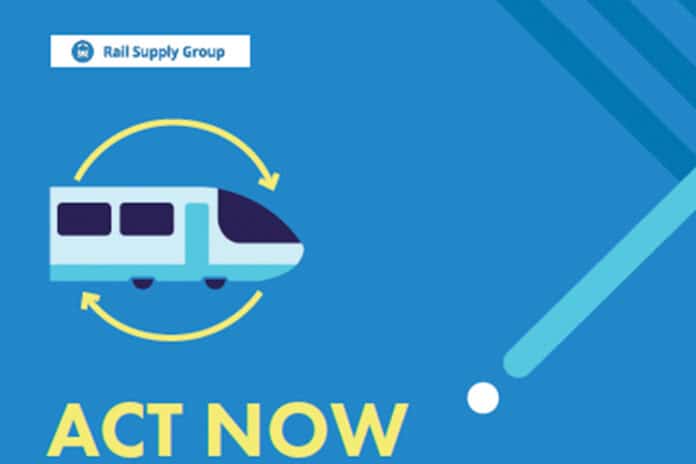The Rail Supply Group (RSG) publishes two reports, its latest industry-wide Pulse Survey Results – detailing the impact of the coronavirus pandemic on rail businesses – and its ACT NOW update on improving ‘Work Pipeline Visibility’.
In Spring 2020, the Government asked the RSG to form a COVID-19 Taskforce to put in place measures to support the rail industry and accelerate the Rail Sector Deal priorities that would bring about the best possible and fastest recovery.
The RSG undertook two surveys in Spring 2020 and in Winter 2020/21. The latest survey results from 399 companies showed that a large number of businesses across the rail sector remain very concerned about their future, and many are experiencing difficulty. However, there are signs of improvement, with fewer businesses reporting reduced revenue and demand than in Spring 2020.
“It is great to see the resilience shown by businesses right across the sector which have quickly adapted to new ways of working and are determined to survive this crisis. The situation remains challenging for a significant number of suppliers, but I believe the sector can be stronger as it emerges from the pandemic,” said, Philip Hoare, Chair of the Rail Supply Group
The RSG has listened to the survey responses and, in partnership with the industry, has taken action to improve work pipeline visibility, part of its ACT NOW series of initiatives. To understand the practicality and appetite for making work pipelines visible on in-flight projects, the RSG undertook eight pilot projects involving 28 rail suppliers from all levels of the supply chain and spanning the entire industry.
Key findings:
- Work pipeline visibility and sufficient cash flow across the entire supply chain remain the two most important factors for ensuring short-term survival and longer-term recovery, with 27% of businesses saying work pipeline visibility will be the most important area in 7-12 months’ time and 23% saying cash flow.
- If the effects of Covid-19 were to continue for up to 12 months, only 62% of respondents would be confident of their organisation’s survival, falling to 52% if the crisis goes on for longer. Although there is an increase in confidence since Spring 2020, the levels remain a cause for concern.
- The availability of labour and skills as a barrier to recovery is now more important than last summer and was identified by 35% of businesses, compared with 26% in Spring 2020.
- The pilot projects have shown ‘improving work pipeline visibility’ is a key enabler for increasing productivity in the short-term in relation to planning efficiencies and resource utilisation; but also, in the long-term when looking at training, apprenticeships, staff retention and facilitating innovation.
- Each pilot project showed there is sufficient information already available to provide in-flight visibility of their work pipeline that could be shared with the supply chain, incurring minimal or nil cost, enabling forward planning horizons to be increased significantly.
The work by RSG has highlighted opportunities for further work. It will:
- Establish an Industry Expenditure Transparency Charter to be signed by at least 250 organisations so it becomes an integral part of current contracts and future procurement.
- Extend the equivalent of the work pipeline visibility commitments in the Network Rail SME Supplementary Action Plan to more suppliers.
- Build on the alignment with the Construction Playbook which emphasises Strategic Supplier Relationship Management and Successful Relationships.
- Demonstrate the value of taking action to increase work pipeline visibility.
The ACT NOW initiative to increase work pipeline visibility has been well received by all those involved. The RSG will now apply its findings across the industry to strengthen the mutual bond between government and industry.
Philip Hoare, Chair of the Rail Supply Group, said: “The Rail Supply Group together with the industry has worked incredibly hard to make ‘work pipeline visibility’ a reality. It’s evident that rail suppliers need confidence in order to invest in their people, skills, services and new ideas, and now there is an indisputable appetite and commitment from the biggest project sponsors to provide that confidence. What’s clear is that collaboration must now filter down the supply chain to make this visibility real at all stages of a project. The next step is to develop an industry-wide Expenditure Transparency Charter as part of future procurement and contracting processes.”
Business Minister Lord Callanan, said: “It is good to see signs of confidence beginning to return to the rail sector, in part thanks to the role the Rail Supply Group has played in taking swift action to support the industry.
“Establishing a visible pipeline of work is a great example of industry-wide collaboration in practice, with some of the rail industry’s largest clients and many of their suppliers committed to far more transparency. This move should help to increase productivity and competitiveness and help the UK build back better.”
Rail Minister Chris Heaton-Harris, said: “We are grateful to the Rail Supply Group for their work on this report.
“We will continue to work closely with the whole industry to deliver a host of ambitious improvements, including the Transpennine Route Upgrade, restoring lines closed during the Beeching cuts, supporting innovation and building HS2, all focused on levelling up our country and building back better.”
To find out more about both reports:
The Rail Supply Group’s ACT NOW REPORT: Improving Work Pipeline Visibility
Pulse Survey Results: The Impact of the Pandemic on Rail Businesses



































 0113 2082620
0113 2082620 info@railbusinessdaily.com
info@railbusinessdaily.com 15 Mariner Court, Wakefield WF4 3FL
15 Mariner Court, Wakefield WF4 3FL

